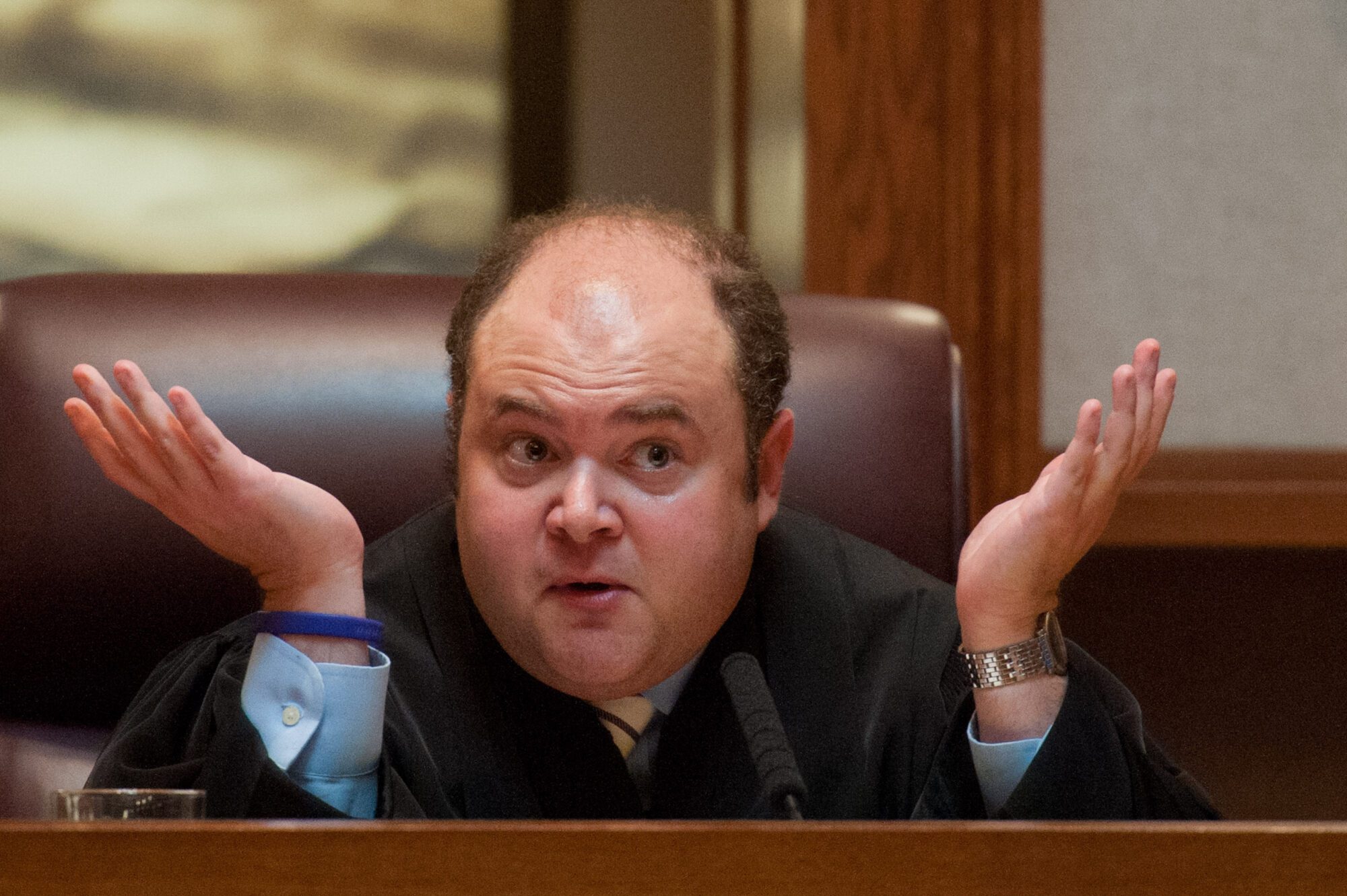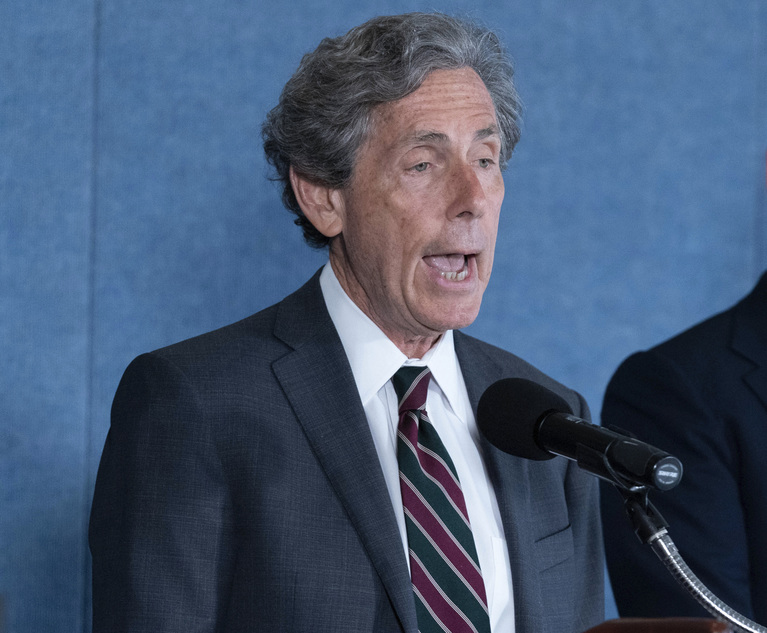A profession struggling for more equitable representation confronts a legal activist who wants law firms to be colorblind.

www.law.com
Is Edward Blum Done Suing Law Firms?
A profession struggling for more equitable representation confronts a legal activist who wants law firms to be colorblind.
After a U.S. Supreme Court win that ended affirmative action in college admissions, Edward Blum began targeting law firms in August.
Several law firms responded by canceling or modifying their diversity fellowships, opening them to all applicants.
Some law firm diversity professionals said Blum's skepticism of DEI is due to a misunderstanding of how firms go about it.
Edward Blum, the conservative legal activist who this year helped dismantle affirmative action in college admissions and prompted law firms to open diversity fellowships to all applicants, may not be done suing law firms after all.
After Blum dropped a recent lawsuit against Winston & Strawn, Bloomberg Law reported Blum said he was done suing law firms. Blum meant he was done for now. “If we learn of a law firm that has a policy similar to the ones we sued and they have not changed it, and a plaintiff wants to apply for that position who is disqualified because of their race, we will file a lawsuit against that law firm,” Blum said in a recent interview with The American Lawyer.
Data from NALP, the American Bar Association and the American Lawyer indicate that the legal profession does not reflect American society in terms of who ends up becoming a lawyer, with some races, ethnicities, gender identities and sexual orientations tending to have better luck than others. That systemic prejudices are to blame, and that the profession’s leading law firms ought to break down barriers that enforce them, is a broadly held opinion in Big Law today.
It is not the opinion of Blum, however. He was already instrumental in getting part of the 1965 Voting Rights Act overturned and ended affirmative action in college admissions through eight trips to the U.S. Supreme Court by the time he filed complaints against Perkins Coie and Morrison & Foerster in August.
The affirmative action case, Students for Fair Admissions v. Harvard, provided what Blum characterized as a new judicial doctrine on the influence of “racial preferences” at law firms and in other arenas such as higher education, public education and voting.
“If that is forbidden in higher education then I think most law firms have recognized that other entities outside of higher education that use racial classifications and preferences to achieve diversity are suspect,” Blum said. “That’s the whole ball of energy behind what has happened with the law firms.”
He filed a third complaint against Winston in October, with each lawsuit alleging discrimination against straight white men who would have applied for minority fellowships but for the fellowship’s preference toward minorities.
In statements to the media and letters to colleges that used affirmative action, Blum has stated that societal participation is a series of zero-sum games, where any opportunity specifically allocated to people from underrepresented groups is an opportunity taken away from the majority.
Asked whether he cared about the lack of diversity in the legal profession, Blum responded that civil rights laws do not accommodate attempts to achieve racial proportionality. “Policies that aim to reach racial proportionality that reflects the overall racial makeup of the nation have always been illegal,” he said.
Blum got what he wanted out of the lawsuits. In October, he dropped his suit against Perkins after the firm canceled a diversity fellowship that sought applicants from underrepresented groups and replaced it with a race-neutral one. The same month, he dropped his suit against Morrison & Foerster after the firm agreed to not use membership in a historically underrepresented group in its application criteria. And in December, he dropped the Winston lawsuit after the firm offered the same remedy.
Blum and his nonprofit, the American Alliance for Equal Rights (AAER), also sent letters to Adams and Reese, Hunton Andrews Kurth, Fox Rothschild and Susman Godfrey threatening litigation if the firms didn’t make similar changes. Adams and Reese canceled its minority fellowship after receiving the letter.
Fox Rothschild updated its criteria to state its fellowship would be awarded on a variety of factors including “commitment to diversity and inclusion efforts in the legal community.” In an October response letter, Hunton said it was unable to answer Blum’s questions about its 1L Diversity Clerkship but might make changes “in response to legal considerations or otherwise.”
Susman recently increased the size of its 1L Diversity Fellowship and the size of its Susman Godfrey Prize, a scholarship for law students of color. However, the firm also opened its 1L Diversity Fellowship to all first-years who experienced hardships or disadvantages and ended the summer clerkship formerly attached to the Susman Godfrey Prize, adding that it would provide mentorship to winners.
“All of them made substantial changes to their programs which were sufficient for AAER to suspend any plans to bring legal actions,” Blum said.
Blum’s career in legal activism has relied on finding the right plaintiffs. If another person comes forward who feels disadvantaged by a policy that Blum’s team finds actionable, the litigation will continue, he said.
Beyond Minority Fellowships
Blum’s lawsuits and legal threats prompted a broad review of law firms’ DEI efforts, in part because of fears that Blum’s skepticism of diversity programs—and financial support from wealthy conservative families and dark money groups—would lead him to attack other areas of DEI.
Indeed, Blum characterized DEI efforts such as training on white privilege as “polarizing” and “disunifying,” although not illegal. But other areas of law firm DEI could be actionable in certain circumstances, he added. “It becomes fuzzy when that policy is open to everyone but the goal is to create a racially diverse institution or employee pool, how that’s done has to be analyzed on a case-by-case basis,” Blum told The American Lawyer. “Using racial classifications and preferences exclusively will virtually always be actionable.”
Some law firm diversity professionals said Blum’s skepticism of DEI is due to a misunderstanding of how firms go about it. Diversity is about far more than race and ethnicity, several chief diversity officers said, underscoring the fact that a straight white man could be afforded opportunities allocated for diverse attorneys due disability status or veteran status.
Blum also signaled that he may sue law firms that use new criteria in diversity fellowship applications that act as a proxy for race, something he accused Winston & Strawn of doing in his complaint against the firm.
In an October response letter, Winston Chicago managing partner Cardelle Spangler, a labor and employment lawyer, fired back at Blum. “Note that your implication that the terms ‘disadvantaged’ and ‘historically underrepresented’ necessarily refer to race is baseless,” Spangler said.



 boltsmag.org
boltsmag.org


